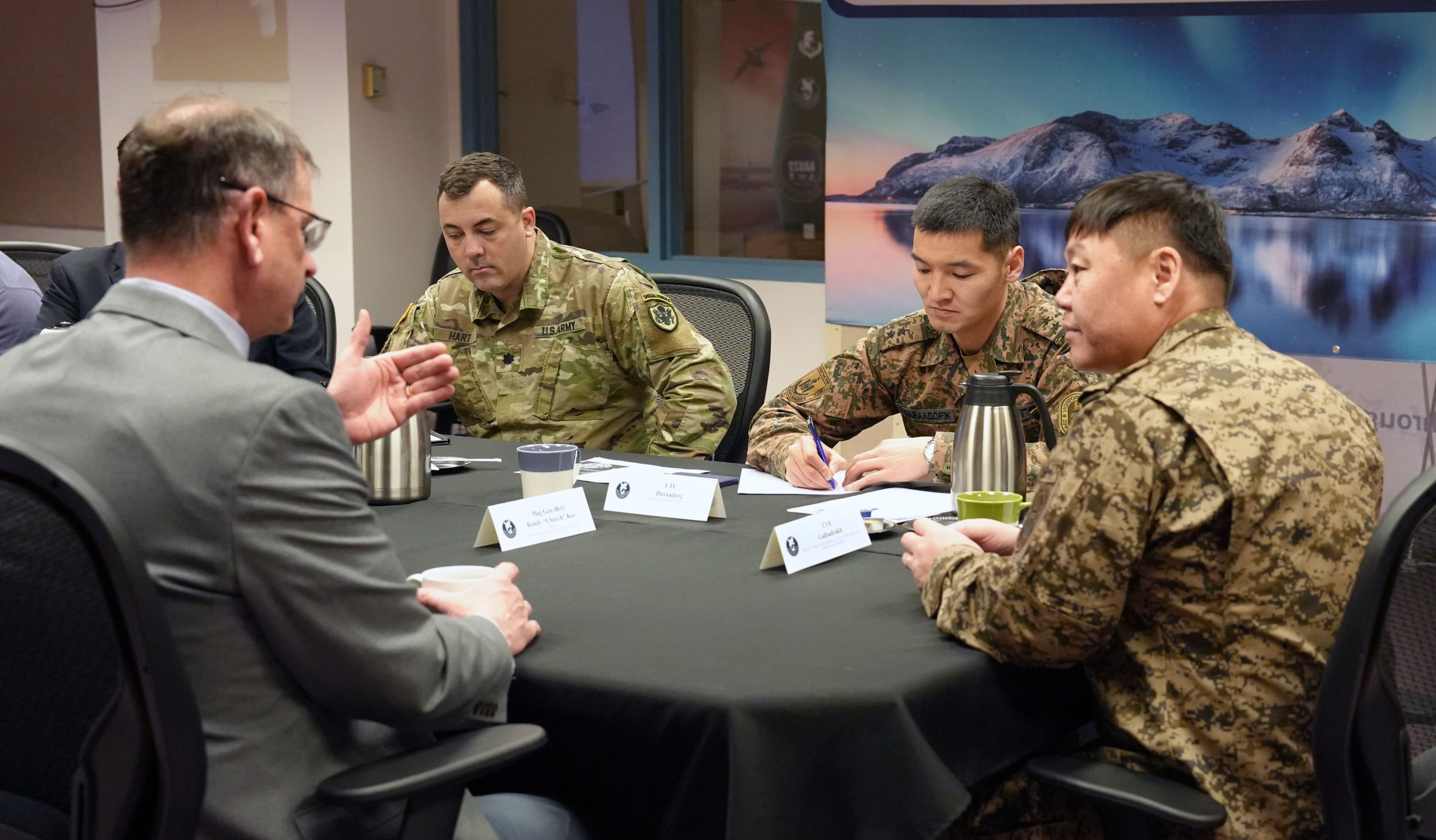
In another significant stride toward increased international security cooperation, Colonel T. Galbadrakh, Deputy Chief of the General Staff of the Mongolian Armed Forces, made a pivotal visit to the Ted Stevens Center for Arctic Security Studies on Feb. 14.
Welcomed by Randy “Church” Kee, the Director of the Stevens Center, and other TSC leaders and staff, Galbadrakh’s visit marked a significant milestone in enhancing ties between Mongolia and the United States, particularly in the realm of defense and security.
The visit, coordinated through the National Guard’s State Partnership Program (SPP), underscores the program’s evolution into a vital instrument for bolstering U.S. security cooperation on the global stage.
Originating from a U.S. European Command initiative in 1991, the SPP has burgeoned over its 30-year history, encompassing 88 partnerships with nations worldwide. Alaska and Mongolia formalized their partnership under the SPP in 2003, laying the groundwork for enduring collaboration in defense and security affairs.
“Alaska is at the intersection of the Indo-Pacific and the Arctic. Like Mongolia, our location is strategic, and the importance of our security partnership cannot be understated,” explained Kee.
During the visit, discussions between Galbadrakh and TSC leadership delved into avenues through which the center could extend educational opportunities to members of the Mongolian Armed Forces. Emphasizing the importance of innovation in enabling decisive multidomain operations, both parties explored strategies to harness the expertise housed within the TSC to address contemporary security challenges effectively.
“Mongolia and the United States have many shared security interests. By facilitating the Mongolian Armed Forces’ participation in our courses, we expand our network of like-minded security practitioners from the Indo-Pacific to gain insights about the developing strategic challenges of the Arctic region,” said Kee.
Central to the mission of the TSC is the establishment of robust, sustainable networks of security leaders, both domestically and internationally. Anchored in promoting and conducting focused research on Arctic security, the center aims to advance DoD security priorities in the region. The center’s School for Arctic and Climate Security Studies is dedicated to offering courses and fellowship opportunities to nations with Arctic interests, reflecting its commitment to fostering a cadre of alumni focused on security cooperation.
“Our international course participants are essential to developing a shared understanding of the contemporary security environment. Their perspectives are invaluable to address current and emerging security concerns,” continued Kee.
While Mongolia may not be geographically situated in the Arctic, its strategic partnership with the United States underscores a shared interest in ensuring stability and security in the region. Galbadrakh’s visit to the TSC served as the inaugural step in welcoming the Mongolian Armed Forces to engage in the center’s programs, ranging from courses to research papers and fellowship initiatives.
“Central to this relationship with the Mongolian Armed Forces is our enduring partnership with the Daniel K. Inouye Center for Asia Pacific Security Studies. While the Mongolian Armed Forces are well familiar to the outstanding programs on the Inouye Center, they now have the benefit of two DoD regional centers working seamlessly from the Pacific into the Arctic,” said Kee.
Looking ahead, both parties expressed enthusiasm for fortifying this burgeoning relationship, integrating the Mongolian Armed Forces into the international network of security practitioners cultivated by the TSC. Together, they aim to enhance interoperability in the Arctic region alongside Allies and partners, contributing to a stable, rules-based order.
As the world navigates an evolving security landscape, partnerships forged through initiatives like the SSP reaffirm the enduring commitment to collective security and cooperation. The visit of Galbadrakh and his delegation to the center signifies a pivotal moment in advancing these shared objectives, underscoring the importance of education, research, and collaboration in safeguarding the interests of nations in the Arctic and beyond.
Photo by Amber Kurka | Randy “Church” Kee, the Director of the Stevens Center speaks with Colonel T. Galbadrakh, Deputy Chief of the General Staff of the Mongolian Armed Forces, during a visit to the center located on Joint Base Elmendorf-Richardson, Feb. 14, 2024. Galbadrakh’s visit marked a significant milestone in enhancing ties between Mongolia and the United States, particularly in the realm of defense and security. The visit, coordinated through the National Guard’s State Partnership Program (SPP), underscores the program’s evolution into a vital instrument for bolstering U.S. security cooperation on the global stage. View Image Page
